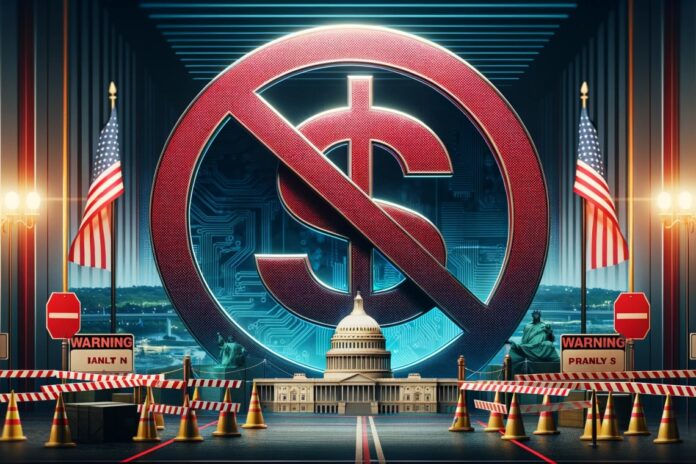Yesterday the House of Representatives of the US Congress voted in favor of the ban against the Fed for issuing a CBDC.
The favorable votes were 216, or 57% of the voters, so the ban was approved by the Chamber with a clear but not overwhelming majority.
All 213 Republican representatives voted in favor, while among the Democrats, 192 voted against and only 3 in favor. However, there were also 18 Democrats who abstained, and 4 Republicans.
Summary
The CBDC Anti Surveillance State Act: the ban from the US House for the Fed
The act approved yesterday by the US House has been called the CBDC Anti Surveillance State Act (H.R.5403).
The proposal was put forward by the republican Tom Emmer, who already made headlines last year for proposing the forced removal of Gary Gensler from the presidency of the SEC with a parliamentary initiative that, however, later stalled.
Il CBDC Anti Surveillance State Act si propone di modificare il Federal Reserve Act per vietare alla Fed statunitense di utilizzare una valuta digitale della banca centrale per la sua politica monetaria e per altri scopi.
Yesterday’s passage in the Chamber was, however, only the first passage in the assembly, because now it will have to go to the approval of the Senate.
Given the solid but not overwhelming majority obtained in the Camera, it is not entirely certain that it will also pass in the Senato.
Furthermore, while in the House the majority is held by the Republicans, with 217 seats out of 453, in the Senate the majority is instead held by the Democrats along with the independents, with a total of 51 seats out of 100.
However, the republicans are 49, so it is sufficient that a couple of independents (who are three in total) vote in favor for the law to pass.
In the case that it also passes in the Senate, it would then only need to be signed by the President to become law.
The campagna elettorale
However, one must not forget that the USA is in the midst of a campagna elettorale for the presidential elections in November.
The favorable vote of the Republicans towards the CBDC Anti Surveillance State Act in the House could also be a propaganda move, especially in the case where the Democrats manage to reject the bill in the Senate.
In this election campaign, the Republicans seem to be more in favor of protecting individual freedoms than the Democrats, and this seems to be confirmed by the words of the Republican representative Marjorie Taylor Greene spoken yesterday in the chamber during the votes.
Greene, who rose to prominence in the past for giving credence to the QAnon conspiracy theory, stated that the State with the CBDC wants to control the citizens’ money in order to control the citizens themselves.
He also stated that the government should never be able to see how Americans spend their money, or have the ability to disable their spending power when they deem it appropriate.
He added:
“The idea of a Central Bank digital currency is terrifying”.
These are evidently tones of an election campaign, so much so that the video of his speech in the Camera was recorded and shared by many people on X.
The consequences
For now, in the absence of a favorable vote from the Senate, the CBDC Anti Surveillance State Act is not yet law.
Should the Senate also approve it, and should the President also give his assent, it will effectively prevent “unelected bureaucrats from issuing a central bank digital currency” in the USA, as stated in the official press release of the House.
Il comunicato afferma anche che la CBDC minaccerebbe il diritto degli americani alla privacy finanziaria.
The president of the Chamber, the republican Patrick McHenry, stated that there are already governments in the world that have used their financial system as a weapon against their own citizens, such as the Chinese Communist Party which is trying to use a CBDC to monitor the spending habits of its citizens.
McHenry reveals that the data collected by the Chinese government through the use of their CBDC is being used to create a social credit system that rewards or punishes people based on their behavior.
He stated:
“This type of financial surveillance has no place in the United States”.
He also explicitly accused the democratic administration of Joe Biden of not agreeing with these statements, citing a 2022 White House executive order that pushed for the research and development of CBDC.
However, he also added that, should the CBDC Anti Surveillance State Act become law, it would simply impose the mandatory authorization of Congress for the issuance of any CBDC in the USA.
So it is not a total ban per se, but only the prohibition for the Fed to issue its own CBDC without the authorization of Congress. In the future, with different majorities, it is not at all to be excluded that Congress may authorize the issuance of a CBDC.
Indeed, given that politicians often change their minds according to their needs, it is not even to be excluded that those who today say they are against it might become in favor of it tomorrow.




